Five GA Leaders Discuss a Common Solution
by ANN Correspondent Mark Sletten
Five big names in the general aviation (GA) community sat
Tuesday at AirVenture for a panel discussion hosted by EAA
President Paul Poberezny at the Sporty's pavilion. Jack Pelton,
Chairman and CEO of Cessna, National Business Aviation Association
(NBAA) President Ed Bolen, Phil Boyer, President of the Aircraft
Owner's and Pilot's Association (AOPA), Cirrus co-founder and CEO
Alan Klapmeier, and Pete Bunce, President of the General Aviation
Manufacturer's Association (GAMA) chose AirVenture as the forum to
present a united front in the face of growing concerns over FAA
user fees.
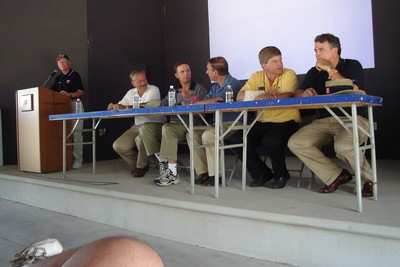
EAA's president started the discussion with a strong statement
of solidarity that met with applause from the audience. "Let's
start by defining GA; it's ultralights, LSA, piston singles, twins,
turbines, business jets... we're all in this together."
Cessna's Pelton emphasized that "we must take this
seriously," because the situation is different from past attempts
at instituting user fees. He stated user fees are clearly meant to
benefit the Airline Transport Association (ATA) and the airlines at
the expense of GA... even going so far as to describe them as GA'
"enemy."
What's their motivation? Says Pelton, "Since 9/11 busy people
are tired of dealing with long lines at security and flight delays;
the airlines are clearly losing business to GA." He questioned why
GA should pay a higher percentage of the costs for the ATC system
when clearly it's designed to support airline operations.
"The major costs for ATC revolve around the airline-developed
hub and spoke system, which GA doesn't use," Pelton added.
"Shift cost, control the system... that's the heart of ATA's
Smart Skies proposal," said NBAA's Bolen. He says the ATA believes,
and would like everyone else to believe, that "a blip is a blip"
and all aircraft in the system should be treated (and charged, of
course) equally. This despite the fact that airliners are clearly
treated differently in the ATC system. "User fees are a form of
tax, and if we're not vigilant the ATA will tax [some] users out of
the system."
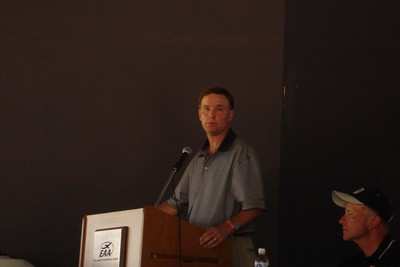
Mr. Boyer described how Jim May of the ATA told him that
non-turbine aircraft are "off the hook" and piston singles, the
bulk of AOPA's membership won't pay anything. "This is simply an
attempt to 'divide and conquer'; we must stand together," he said
to more applause.
"Imagine hearing, 'Cessna 123, you're cleared to land 18L... as
soon as I get your credit card number, expiration date and PIN,'"
Boyer said. "This is not the way we want to do business with the
FAA."
Boyer went on to describe how user fee programs have decimated
GA in countries around the world. In one tragic case, a New Zealand
GA pilot was lost for several weeks before search and rescue
personnel were able to locate his body after he crashed in a remote
region. The pilot's wife told officials her husband hadn't filed a
flight plan, which might have saved his life, because he'd wanted
to avoid the fees involved. Boyer urged everyone in the audience to
let their political representatives know how they feel about user
fees, "Congress shouldn't allow the airlines to control America's
airspace system."
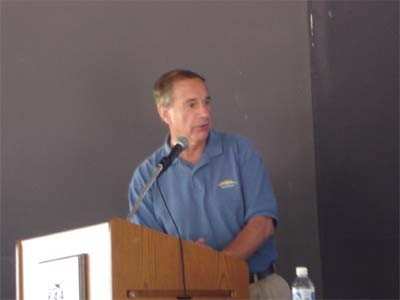
Cirrus' Alan Klapmeier called ATA's Smart Skies proposal
"disingenuous."
"They are telling the public that GA should pay to use the
airspace system as if we aren't already paying via a fuel tax,"
said Klapmeier. "We believe it's not about whether or not we should
pay, but how we determine everyone's fair share."
He described a dire future in which user fees eliminates users,
most likely GA users, which, in turn, means higher fees for the
remaining users. "It's a downward spiral that benefits only one
agency, the ATA."
GAMA's Bunce explained how system costs are a function of salaries.
"As the system becomes more complex training costs increase.
Consequently, the value of personnel increases and salaries must
grow to compensate. System complexity is a function of the number
of planes in a particular area. Putting a lot of planes in a small
area is a complex undertaking and the associated costs should be
paid by those who need that service, specifically the
airlines."
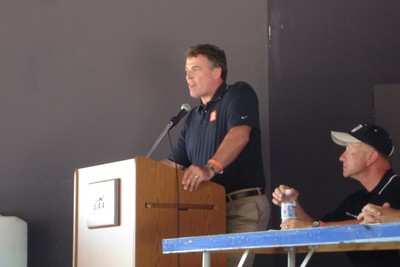
Bunce said that GA users comprise only 6% of the operations at
the 35 major hub airports that serve the airlines. "Not one of
those 35 airports is on the list of the top twenty airports serving
GA -- we don't operate where they do."
Bunce believes that when considering GA's share of system costs
GA's investment in modernization must be considered. "These
technologies will reduce ATC's workload and eventually we all
benefit, including ATA." He expressed his displeasure that ATA
discusses user fees as if they were a fait accompli, "Before any
discussion of user fees we must determine costs. To this point
there's been no discussion of how much this will all cost. We have
to emphasize that airlines create the complexity and drive the
costs."
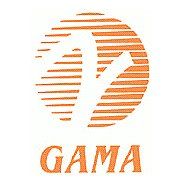 He also reminded the
audience that when GA was banned from Washington Reagan National
airport following 9/11, ATC's workload remained the same.
He also reminded the
audience that when GA was banned from Washington Reagan National
airport following 9/11, ATC's workload remained the same.
During the Q&A following the panel's comments an audience
member noted that the airlines pass on their passenger taxes to
their customers. "We'll pay user taxes whether we use our own
planes or fly on the airlines." Another attendee asked if anyone
had estimated how much user fees might actually cost.
Ed Bolen calculated if you distributed the $2 billion shortfall
claimed by the FAA among GA's turbine fleet each user would pay
approximately $100,000.
So what can you do? "Keep it pithy and personal," advised Bolen,
"Tell your congressman it's about control, not blips. The airlines
want to pay less, but control more. If the airlines want user fees
they should give the ticket tax they collect from their passengers
back to their passengers."
 SpaceX to Launch Inversion RAY Reentry Vehicle in Fall
SpaceX to Launch Inversion RAY Reentry Vehicle in Fall Aero-News: Quote of the Day (04.23.24)
Aero-News: Quote of the Day (04.23.24) Aero-News: Quote of the Day (04.20.24)
Aero-News: Quote of the Day (04.20.24) ANN's Daily Aero-Linx (04.20.24)
ANN's Daily Aero-Linx (04.20.24) Aero-News: Quote of the Day (04.21.24)
Aero-News: Quote of the Day (04.21.24)







